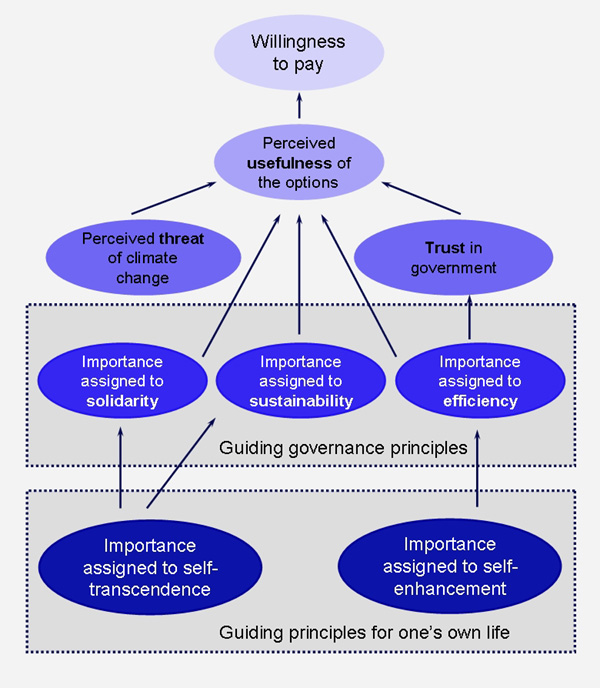Understanding public preferences for water management strategies in the context of climate change
Published on 13 October 2010 in Climate, water and energy
Introduction
Climate change is expected to cause major changes in precipitation patterns all over the world. Over the coming decades, this will heavily influence riverine water flows and availability of water resources. For Scotland, scientists project that changes will result in increased flood risk and potential water shortages. Such concerns are mirrored in recent policies. Under the Flood Risk Management (Scotland) Act (2009) authorities are expected “to make provision about the assessment and sustainable management of flood risks”. The Act explicitly requires promotion of landscape-based techniques to reduce flood risk (known as ‘soft engineering’ techniques). Soft engineering is expected to also mitigate severe low flows.
Policy implementation can be informed by assessments of public support for policy options,such as soft engineering or public insurance schemes. Policies to respond to climate change involve a high degree of uncertainty, because knowledge about future changes and the effectiveness of potential measures is insufficient. Public preferences for different policy options are therefore likely to be influenced by a) beliefs about the magnitude of the problem, b) perceived capacity to cope with it, c) the expected outcomes and d) beliefs about the wayin which outcomes should be achieved. However, simple opinion polls do not capture the relationships between such perceptions and attitudes towards policy options. More complex approaches are required to provide an understanding of the links between public views on the problem, and their support for different policy options.
Key Points
- The results of a Scotland-wide survey show that there is considerable support among the Scottish public for investments into measures to adapt to floods and low flows in Scotland.
- A soft engineering scheme (‘prevention’) is preferred over a council insurance scheme (‘cure’). However, a majority of respondents opted for a combination of the two approaches, suggesting a preference for diversified strategies.
- Participants’ perceptions of the potential threat of flooding and low flows and the different policy options informed attitudes and willingness to pay (WTP) for policy measures.
- In particular, guiding principles for policy making, such as sustainability, solidarity and efficiency, played an important role in the decisions of our respondents.
Research Undertaken
Our study set out to investigate public preferences for two different policy options to adapt to increased risk of both flooding and low flows – (i) implementation of soft engineering measures and (ii) a council insurance against damage to public property. Rather than to simply gauge support for these measures, we examined if and how preferences are connected to more general views on the situation and policy interventions. In particular, we assessed the role of governance-related values such as efficiency, solidarity and sustainability that allow individuals to evaluate a policy option even if its outcomes are highly uncertain.

Policy Implications
Our findings are supportive of the sustainability-oriented direction of Scottish flood management policy. Beyond gauging the extent of support for policy options, we aimed to understand better why respondents preferred certain policy options over others. Guiding principles for policy making (or governance-related values) such as sustainability, solidarity and efficiency played an important role in this respect. Such principles are less susceptible to change over time than more concrete attitudes or expressions of WTP for particular policy options. This is especially relevant for policies that require a long-term approach and might therefore undergo modifications over time, such as those responding to climate change related increase in risks of flooding and water shortages.
Reference
Author
Anke Fischer (Macaulay Land Use Research Institute) and Klaus Glenk (Scottish Agricultural College). a.fischer@macaulay.ac.uk







